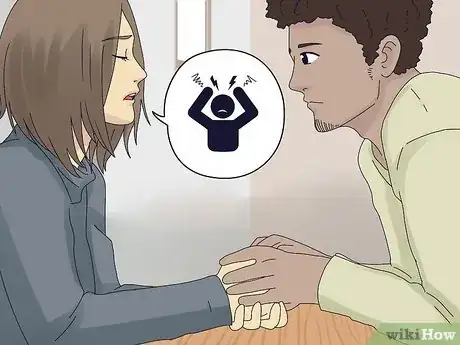This article was co-authored by Asa Don Brown, PhD, DNCCM, FAAETS and by wikiHow staff writer, Madeleine Flamiano. Dr. Asa Don Brown is a Clinical Psychologist with over 25 years of experience. He specializes in working with families, children, and couples, treating a variety of psychological disorders, trauma, and abuse. Dr. Brown has specialized in negotiation and profiling. He is also a prolific author having published three books and numerous articles in magazines, journals, and popular publications. Dr. Brown earned a BS in Theology and Religion with a minor in Marketing and an MS in Counseling with a specialization in Marriage and Family from The University of Great Falls. Furthermore, he received a PhD in Psychology with a specialization in Clinical Psychology from Capella University. He is also a candidate for a Masters of Liberal Arts through Harvard University. Dr. Brown is a Fellow of the American Academy of Experts in Traumatic Stress and a Diplomate for the National Center for Crisis Management and continues to serve a number of psychological and scientific boards.
There are 14 references cited in this article, which can be found at the bottom of the page.
This article has been viewed 12,000 times.
Wondering if you’re still in the honeymoon phase of your relationship? We’re here to answer all your questions about this thrilling chapter. In this article, we’ll explain everything you need to know about the honeymoon phase, including how long it lasts, how to tell if it's over, and what to do once it ends. Read on to learn how to keep the spark alive no matter how long you’ve known your partner.
Steps
How do I enjoy the honeymoon phase?
-
1Praise your partner as often as possible. The honeymoon phase is a great opportunity to see all the best qualities in the person you’re dating. While you’re still head-over-heels and looking for the positives, make a mental list of everything you adore about them. Then, shower your S.O. with all those compliments so they feel cherished.[3]
- Bring up strengths, talents, and gifts. Make a comment like, “You are such an amazing teacher! I love all the passion you have for your students.”
- Cherish lovable quirks and silly habits. “It’s so funny how you hate Scrabble but love crossword puzzles. What’s the difference?!”
- Point out special traits they might not notice about themselves. For example, you can say, “I love how you organize all your coupons! Your way of budgeting for everything inspires me.”
-
2Create fun memories together. While you’re still romanticizing every little moment, use this chapter of your relationship to enjoy unforgettable times with one another. Whether you have your first beachside picnic or go kayaking under the stars, every adventure will be a little more colorful and magical. Down the road, you’ll both reminisce about your amazing first dates.[4]
- Experiment with silly dates that you can laugh about later. For instance, you can dress like you’re going to a really formal party and then toast milkshakes in a fast food joint.
- Focus on milestones. For example, go to a concert you both love to celebrate the first anniversary of your relationship.
- Take a ton of pictures that you'll cherish in the future. Capture a sweet event, like sharing your first holiday with your partner's family.
-
3Make the most of the passion you feel for each other. Your lust and enthusiasm for each other is at its all-time high. Since you probably can’t resist each other, just have fun with it. Be intimate as long as you like and as often as you have time for. Experiment together and test out new fantasies. You’ll both look fondly upon this chapter because it was so wild and steamy.[5]
- Treat each other to tons of physical touch and affection. Now's the time to snuggle up to each other or make out whenever the moment strikes.
- Switch up your styles of intimacy—be sweet and gentle one night and really bold the next.
- Let go of your inhibitions while you’re full of hormones and desire. Discuss spicy activities you've never tried and then give them a shot.
-
4Talk about your plans for the future. The honeymoon phase helps bring out the true idealists and the hopeless romantics in the both of you. It’s also the time you’re least likely to have doubts or notice any challenges. Channel all your optimism and positivity to picture the relationship you’d love to have years from now.[6]
- Chat about your ideal careers and how you’ll both lift each other up. For example, say, "Since you'll be a pro athlete and I'll be a nutritionist, let's both focus on our health!"
- Discuss how you’ll take breaks and unwind with whirlwind trips. Plan something like, "When we both have enough PTO, we should definitely make it out to Hawaii for some sushi and sunbathing!"
- Brainstorm the home you’ll live in together. Make a comment like, "We should get a home with an extra bedroom for when my parents visit and an office so you can edit your videos in peace!"
How do I know when the honeymoon phase is over?
-
1You stop trying to impress each other. The honeymoon phase begins to fizzle the moment the spark begins to fade. Since it's all about how much you dazzle each other, it starts to end when you no longer feel you have to be your “best selves” in the relationship. While the duration of the honeymoon phase depends on the couple, the biggest sign that it’s over is when you both feel you’ve become “comfortable.”[7]
- You’ll both probably stop working so hard to win one another over. For example, your S.O. might leave dirty laundry all over the place or you might stop dressing up for date nights.
-
2You both see each other’s flaws. You no longer consider your partner’s quirks “cute” and you start to notice some personality traits or qualities that bother or challenge you. While you used to adore every single thing your S.O. said or did, now you realize that they’re far from perfect.[8]
- This is when the “cracks” start to show — any issues that seemed small before will feel like real annoyances or problems. For example, maybe you think your partner is too impulsive and wish that they'd be more patient.
- This happens because the euphoric high of being in love usually overshadows the annoying aspects of your partner, and that high is now wearing off.
-
3You argue more often. You don’t feel the need to be “nice” all the time and protect each other’s feelings. Instead, the two of you are a lot more assertive and say exactly what’s on your minds. While you were perfectly sweet and understanding in the beginning of your relationship, now conflicts start to arise.[9]
- You’ll both also want less compromises and prefer to just get your needs met ASAP. For example, you might say, “I don’t want to go out with your friends tonight. I’m going to stay home and watch a movie.”
-
4You notice less passion in your relationship. Before, you couldn’t keep your hands off of each other, but now you keep them to yourselves. Instead of jumping at every chance to move your dynamic to the bedroom, you start to come up with excuses about why you’re not in the mood. For example, you may say you’re tired, or your partner might want to catch up on video games. While your desire for intimacy might decrease, it doesn’t disappear completely—it just takes more effort to reignite it sometimes. [10]
- You may seduce each other less often or notice a drop in your libidos. Instead, you might choose to go out for coffee or stay in to watch a show.
What do I do when the honeymoon phase ends?
-
1Have a realistic talk about issues in your relationship. You’ll both be a lot more practical and observant because you’re not glossing over everything anymore. This is actually a huge advantage because you both really “see” each other. In order to create a sustainable, long-term dynamic, discuss how to overcome obstacles and address each other’s needs.[11]
- Check in about if your desires for physical affection and intimacy are getting met. For instance, ask something like, “I think it’s important to have sex at least once a week. Do you agree with that?”
- Chat about whether you’re both experiencing enough quality time with a comment like, “I noticed we haven’t just hung out with our phones off in a while. Why don’t we go hit up a farmer’s market this morning and make a nice brunch?”
- Strategize about how your personalities or habits can work well together. For example, if you love parties but your S.O. doesn’t, consider going solo to help your partner relax more.
-
2Focus on developing emotional intimacy with each other. When the passion and excitement is less intense, look below the surface. Be vulnerable with one another and talk about your past struggles or current concerns. Voice when you feel lonely or need some support. Show that you embrace each other no matter what highs or lows you’re both going through.[12]
- If you feel anything is “missing” in the relationship, talk about it. For example, you can say, “I remember when we used to compliment each other all the time. I’d love it if we made more of an effort to point out what we love about one another.”
- Tell your partner when you need to vent or when you need extra space for yourself. That way, they’ll learn about how you resolve any negative emotions like stress or frustration.
- Share when you feel that certain factors have impacted your enthusiasm and energy level in the relationship. For instance, say something like, “I know I haven’t been very flirty lately, and I apologize for that. Work has really taken a toll on me.”
-
3Stay curious about each other and ask lots of questions. Check in at least once a day and see if your S.O. has any stories to tell. If you randomly wonder about anything, such as if your partner prefers to read or listen to podcasts, bring it up. Remain invested in each other and you’ll realize there’s so much to learn.[13]
- Talk about your current living situation and if you want to improve it. Say something like, “Would you rather retire near the beach or in the mountains?”
- Chat about your values and if they’ve changed over time. Make a comment like, “When I first met you, you thought work was more important than play. Do you think you’ve loosened up about that?”
- See if they’ll give you some insight into their hobbies or interests. For example, you can ask, “Will you show me how to play a simple song on your guitar?”
-
4Share new experiences and go on adventures. Reignite your relationship with bonding activities that you both find interesting and look forward to. Make it a priority to find ways to challenge yourselves mentally and physically. For example, take up chess as well as salsa dancing. You’ll get the same rush from your very first dates and feel like you’re part of a fairy tale romance all over again.[14]
- Physical activities that are really rigorous make your hearts race just like they did in the first stages of your relationship. You can take tennis classes together, for example.
- Anything that’s mentally stimulating, like learning poker together, will boost your feelings of love for each other. You’ll both see that you’ll keep growing together over time.
References
- ↑ https://ohioline.osu.edu/factsheet/FLM-FS-2-01-R10
- ↑ https://www.scientificamerican.com/article/what-physiological-changes-can-explain-honeymoon-phase-relationship/
- ↑ https://www.joinonelove.org/learn/20-things-to-tell-your-s-o-more-often/
- ↑ https://www.psychalive.org/six-tips-to-keep-long-term-relationships-exciting/
- ↑ https://www.sciencedaily.com/releases/2016/02/160225101244.htm
- ↑ https://www.betterhealth.vic.gov.au/health/healthyliving/relationships-tips-for-success
- ↑ https://www.mentalhelp.net/blogs/the-4-stages-of-dating-relationships/
- ↑ https://www.psychologytoday.com/us/blog/get-some-headspace/201307/mindfulness-and-the-phases-relationship
- ↑ https://www.helpguide.org/articles/relationships-communication/conflict-resolution-skills.htm
- ↑ https://courses.lumenlearning.com/atd-herkimer-developmentalpsych/chapter/types-of-love/
- ↑ https://www.nytimes.com/2020/04/03/smarter-living/talking-out-problems.html
- ↑ https://psychcentral.com/blog/how-do-you-create-emotional-safety-in-your-relationships
- ↑ https://greatergood.berkeley.edu/article/item/why_curious_people_have_better_relationships
- ↑ https://beta.nsf.gov/news/new-and-diverse-experiences-linked-enhanced-happiness-new-study-shows








































































